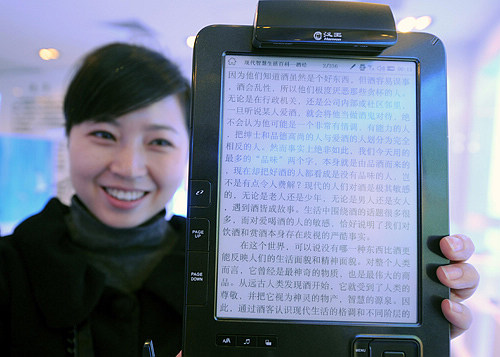|
 |
|
HANVON STRUGGLES: Pictured is a Hanvon e-reader. The Beijing-based e-reader maker, while popular among domestic consumers, is reeling from plunging sales and profits (LI WEN) |
While Amazon felt the pinch as iPad fever sweeps the globe, the company effectively cushioned the impact by lowering Kindle prices. It is reported that Amazon would distribute Kindles for free to subscribers of Amazon Prime, a $79-per-year service that provides customers with free two-day shipping on everything they buy from the company.
Amazon believes it can make money on the giveaway because its best customers will buy enough e-books to make up for the free device over a few years. Amazon has this confidence given a mature market. The share of U.S. adults who own an e-reader surged to 12 percent in May 2011 from 6 percent in November 2010, according to a survey conducted by the Pew Research Center based in Washington, D.C.
Chinese companies are following suit. Hanvon in May 2011 announced to cut prices of major products by 14-40 percent. Shanda Literature, operator of China's largest online literature website, also lowered price of its Bambook e-reader to 499 yuan ($77) from 998 yuan ($155).
But for Chinese companies, the price cut may rub salt into their wounds.
As Chinese customers are less willing to pay for e-book downloads, forcing the companies to rely heavily on device sales as a major source of income, said Zhang Yanan.
Price cuts thus squeeze the profit margin of device makers. Take Hanvon for example. The gross profit margin for its e-reader businesses had decreased to 37 percent in 2010 from 47 percent in 2009 and 51 percent in 2008.
"They have no other choice," said Zhang Yi, President of the Iimedia Research Co. Ltd. "It is the only way to solidify the customer base and convince users to buy e-books."
"While Amazon profits from a sales boom of e-books, Chinese enterprises are struggling with a lack of book content," said Zhang Yijun, Director of the Technology and Digital Publication Department of China's General Administration of Press and Publication.
Amazon's second-quarter financial report said its Kindle Store now has more than 950,000 e-books, including 110 of 111 The New York Times bestsellers. In comparison, Hanvon only had 130,000 titles through its online bookstore by the end of 2010. The firm aims to double the collection in the near future.
In June 2011, Hanvon announced a partnership with Shanda Literature. Hanvon's e-reader users will be allowed access to Shanda's Cloudary online bookstore, which boasts nearly 4 million titles. But 95 percent of its e-books are currently free of charge, and the remaining e-books cost only 10-20 percent as much as paper books.
"A more intractable problem is online piracy, which makes publishers hesitant to develop new e-books," said Hao Zhensheng, President of the Chinese Academy of Press and Publication. "Worse still, it makes consumers even more reluctant to pay for e-book downloads, a detriment to the health of the emerging industry."
Road ahead
Despite these obstacles, industry insiders remain confident of the industry's outlook.
Liu Yingjian, founder and Chairman of Hanvon, said the market downturn is only temporary and the industry is bound for a promising future due to its remarkable user convenience and environmental benefits.
"The iPad, which is more of an entertainment terminal, cannot replace e-readers as professional reading tools," he said. "In addition, the e-ink screen used by e-readers is harmless to one's eyesight, which makes it child- and senior-friendly."
Hanvon will continue to shift its business model to focus more on content services and build a profitable industrial chain, he added.
Hou Xiaoqiang, CEO of Shanda Literature, also said the e-reader will become a necessity for people in the future.
"But the industry is still young and fragile and we need time to fully realize its potential," he said. "The key is to provide more attractive book content and erect defense against online copyright infringement," said Hou.
"One effective solution is to set passwords for paid downloads and make the downloaded e-books unreadable on computers so they cannot be copied and spread on the Internet," said Hou.
"Chinese e-reader producers need to build a profitable business chain that integrates devices, applications, content and value-added services," said Sun Peilin, a researcher with Analysys International.
Amazon, for example, has introduced low-priced Kindle products with advertisements on the bottom of the device's home page and on its screen savers.
But a CCID report said, for most Chinese e-reader producers, it is very difficult to duplicate the Kindle model—device plus content, due to a lack of core technologies and rich content.
"It's still too early to talk about the market scale, but the Chinese market has great potential because of its large user base," said Sun.
The CCID report also said the only way out is to closely tie up with telecom operators such as China Mobile and China Unicom. With a solid customer base, the telecom carriers can help massively promote the e-readers and spread the book content.
"While 5,000 years of traditional book reading will not be displaced overnight with the emergence of a new, popular device, the push for the broader acceptance of e-books will likely go unabated," said iSuppli in a report. | 